高中英语-词汇-Festivals 逐字稿
高中英语教资-词汇课-Festivals-逐字稿
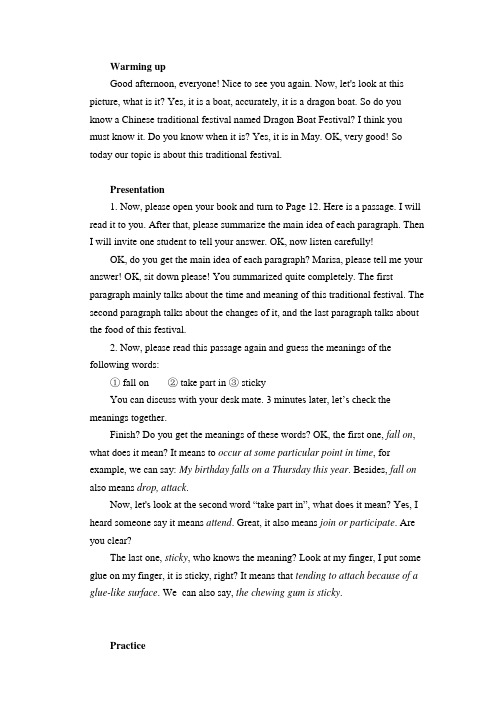
Warming upGood afternoon, everyone! Nice to see you again. Now, let's look at this picture, what is it? Yes, it is a boat, accurately, it is a dragon boat. So do you know a Chinese traditional festival named Dragon Boat Festival? I think you must know it. Do you know when it is? Yes, it is in May. OK, very good! So today our topic is about this traditional festival.Presentation1. Now, please open your book and turn to Page 12. Here is a passage. I will read it to you. After that, please summarize the main idea of each paragraph. Then I will invite one student to tell your answer. OK, now listen carefully!OK, do you get the main idea of each paragraph? Marisa, please tell me your answer! OK, sit down please! You summarized quite completely. The first paragraph mainly talks about the time and meaning of this traditional festival. The second paragraph talks about the changes of it, and the last paragraph talks about the food of this festival.2. Now, please read this passage again and guess the meanings of the following words:① fall on ② take part in ③ stickyYou can discuss with your desk mate. 3 minutes later, let’s check the meanings together.Finish? Do you get the meanings of these words? OK, the first one, fall on, what does it mean? It means to occur at some particular point in time, for example, we can say: My birthday falls on a Thursday this year. Besides, fall on also means drop, attack.Now, let's look at the second word “take part in”, what does it mean? Yes, I heard someone say it means attend. Great, it also means join or participate. Are you clear?The last one, sticky, who knows the meaning? Look at my finger, I put some glue on my finger, it is sticky, right? It means that tending to attach because of a glue-like surface. We can also say, the chewing gum is sticky.PracticeNow, I will give you 3 minutes to work in pairs and make sentences by using these three words. After you finished, I will ask some students to read your sentences to us. Got it? OK, take your time.My coat got dirty when it fell on the muddy floor.Their anniversary falls upon a Saturday this year.We'll take part in social practice during the summer vacation.We often take part in physical labor.I am uncomfortable because my body is sticky .Yuanxiao is a kind of sticky round dumplings.ProductionNow, let's do a group discussion. Work in group of 4 and talk about the festivals you know in foreign countries. You can introduce this festival according to the text and use the new words as much as possible. You are supposed to finish discussion in 6 minutes. Are you clear? OK, let’s do it!Time is limited! So, who wants to share your ideas? What about this group? Who wants to be the representative? OK, John, brave boy! Oh, please in ENGLISH! OK, sit down please! Your presentation is so wonderful! He introduced the Easter Day! Chocolate egg is traditionally eaten on Easter day. Good!Summary & HomeworkSummary: Students think about what they have learned by themselves.Homework: Select the favorite festival and write an introduction about it according to the structure of Dragon Boat Festival.OK, class is over. Bye-bye!。
高一英语必修三Unit1festivals 单元单词讲解
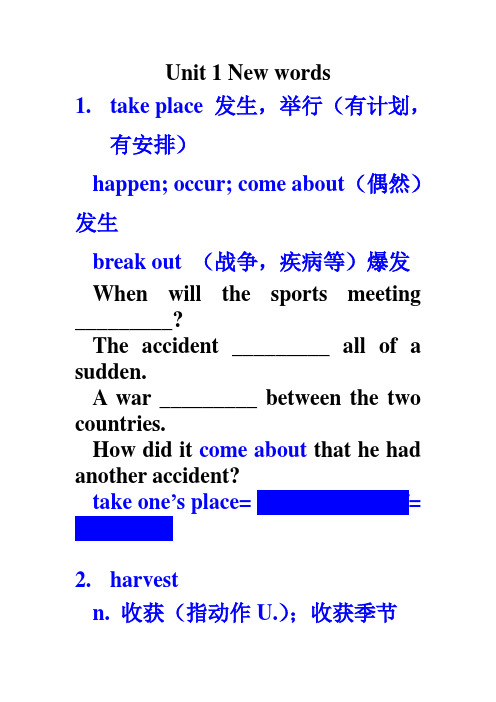
Unit 1 New words1.take place 发生,举行(有计划,有安排)happen; occur; come about (偶然)发生break out (战争,疾病等)爆发When will the sports meeting _________?The accident _________ all of a sudden.A war _________ between the two countries.How did it come about that he had another accident?take one’s place= take the place of= replace sb.2.harvestn. 收获(指动作U.);收获季节the harvest time/ season收成C.,成果There was a large orange harvest last year.这新药是三十年研究的成果。
The new medicine is the harvest of thirty years’ research.vt. 收获,收割Try to harvest the rice before the rain.3.starve (使)饿死;饿得要死v Thousands of people are starving. starve to death 挨饿,饿死I am starving!Nowadays, some girls are starving themselves to lose weight.starve for sth. vi.=be starved of 渴望获得……The homeless children are starving for food.These children are starved of affection.4.origin起源;由来;起因- original-originallythe origin of lifeThe particular custom has its origins in western countries.There are many English words of French origin.许多的英语单词有相同的起源。
高一下学期英语知识点归纳: Festivals
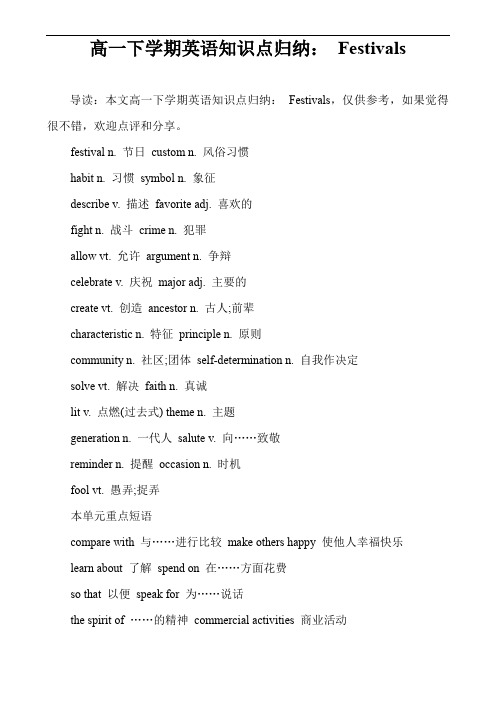
高一下学期英语知识点归纳:Festivals导读:本文高一下学期英语知识点归纳:Festivals,仅供参考,如果觉得很不错,欢迎点评和分享。
festival n. 节日custom n. 风俗习惯habit n. 习惯symbol n. 象征describe v. 描述favorite adj. 喜欢的fight n. 战斗crime n. 犯罪allow vt. 允许argument n. 争辩celebrate v. 庆祝major adj. 主要的create vt. 创造ancestor n. 古人;前辈characteristic n. 特征principle n. 原则community n. 社区;团体self-determination n. 自我作决定solve vt. 解决faith n. 真诚lit v. 点燃(过去式) theme n. 主题generation n. 一代人salute v. 向……致敬reminder n. 提醒occasion n. 时机fool vt. 愚弄;捉弄本单元重点短语compare with 与……进行比较make others happy 使他人幸福快乐learn about 了解spend on 在……方面花费so that 以便speak for 为……说话the spirit of ……的精神commercial activities 商业活动by giving away 以放弃……的方式have got to 必须instead of 替代get out of the car 下车get off 下车take off one's hat 摘下礼帽look into the eyes 直视(某人的)眼睛shake hands with sb. 与某人握手make friends with 与……交朋友the living and the dead 生者和死者the cycle of life 生命周期play tricks on sb. 捉弄某人。
高一必修三英语unit1Festival课文译文
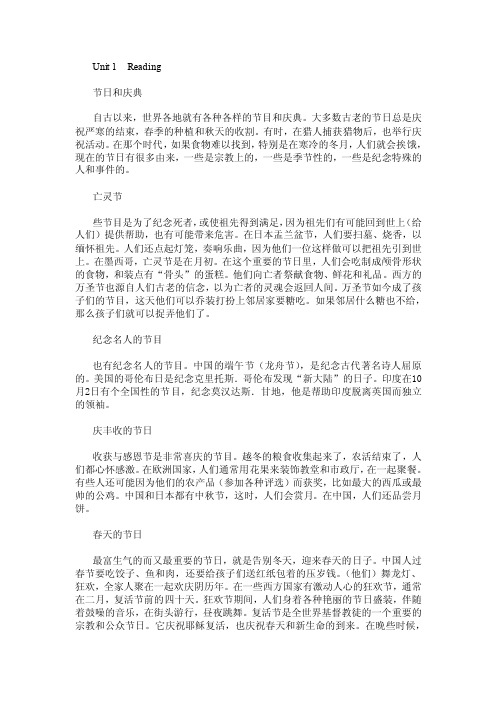
Unit 1 Readin g节日和庆典自古以来,世界各地就有各种各样的节目和庆典。
大多数古老的节日总是庆祝严寒的结束,春季的种植和秋天的收割。
有时,在猎人捕获猎物后,也举行庆祝活动。
在那个时代,如果食物难以找到,特别是在寒冷的冬月,人们就会挨饿,现在的节日有很多由来,一些是宗教上的,一些是季节性的,一些是纪念特殊的人和事件的。
亡灵节些节目是为了纪念死者,或使祖先得到满足,因为祖先们有可能回到世上(给人们)提供帮助,也有可能带来危害。
在日本盂兰盆节,人们要扫墓、烧香,以缅怀祖先。
人们还点起灯笼,奏响乐曲,因为他们一位这样做可以把祖先引到世上。
在墨西哥,亡灵节是在月初。
在这个重要的节日里,人们会吃制成颅骨形状的食物,和装点有“骨头”的蛋糕。
他们向亡者祭献食物、鲜花和礼品。
西方的万圣节也源自人们古老的信念,以为亡者的灵魂会返回人间。
万圣节如今成了孩子们的节目,这天他们可以乔装打扮上邻居家要糖吃。
如果邻居什么糖也不给,那么孩子们就可以捉弄他们了。
纪念名人的节目也有纪念名人的节目。
中国的端午节(龙舟节),是纪念古代著名诗人屈原的。
美国的哥伦布日是纪念克里托斯.哥伦布发现“新大陆”的日子。
印度在10月2日有个全国性的节目,纪念莫汉达斯.甘地,他是帮助印度脱离英国而独立的领袖。
庆丰收的节日收获与感恩节是非常喜庆的节目。
越冬的粮食收集起来了,农活结束了,人们都心怀感激。
在欧洲国家,人们通常用花果来装饰教堂和市政厅,在一起聚餐。
有些人还可能因为他们的农产品(参加各种评选)而获奖,比如最大的西瓜或最帅的公鸡。
中国和日本都有中秋节,这时,人们会赏月。
在中国,人们还品尝月饼。
春天的节日最富生气的而又最重要的节日,就是告别冬天,迎来春天的日子。
高一英语必修三Unit1festivals_单元单词讲解

Unit 1 New words1.take place 发生,举行(有计划,有安排)happen; occur; come about (偶然)发生break out (战争,疾病等)爆发When will the sports meeting _________?The accident _________ all of a sudden.A war _________ between the two countries.2.harvestn. 收获(指动作U.);收获季节the harvest time/ season收成C.,成果There was a large orange harvest last year.这新药是三十年研究的成果。
Try to harvest the rice before the rain.3.starve (使)饿死;饿得要死v Thousands of people are starving. starve to deathI am starving!Nowadays, some girls are starving themselves to lose weight.starve for sth. vi.=be starved of The homeless children are starving for food.These children are starved of affection.4.origin起源;由来;起因-original- originallythe origin of lifeThe particular custom has its origins in western countries.There are many English words of French origin.许多的英语单词有相同的起源。
Many English words are of the same origin.5.religious- religionregion n.6.be in memory of 为了纪念。
高中英语 词汇讲解(Unit 14 Festivals)人教版

Unit 14 Festivals Warming up,Listening and Speaking词汇讲解三点剖析1.People celebrate Mardi Gras by dressing人们通过穿着盛装观看游行来庆祝狂欢节。
dress up盛装;打扮;装饰【典型例句】You don’这次去吃饭你不必穿正式的服装。
Everyone who work迪斯尼乐园的每个工作人员都必须穿19世纪的服装。
大多数小女孩都喜欢打扮成天使。
【要点归纳】dress (sb./oneself) up可及物,也可不及物,常译为“(把某人)打扮(成)……”,可与as,like或in连用。
【相关链接】辨析get/be dressed,dress up,dress oneself,dress in,put on,have on和(1)dress sb.表示“穿衣”时其宾语只能是人;get/be dressed 穿好衣服(表示状态);dress up(为了某场合)盛装,打扮;dress oneself给自己穿衣服,打扮;dress oneself up 把自己打扮起来;dress sb. in...给某人穿穿……(表示状态)。
(2)put on 穿上,戴上(表示动作)。
(3)have on“穿”(衣服、袜子、鞋子、戴帽子等),表示状态,无被动形式和进行时态。
(4)wear广泛用于“穿戴”,包括戴手表、首饰、眼镜,留头发、胡须等。
例如It’s Children’在儿童节,所有的孩子们都穿着新衣。
并非所有的人都喜欢戴手表,尤其是大热天。
随堂演练选择(1)As she entered the hall,we noticed her __________A.wearingC.putting on提示:此处使用wear的现在分词形式表示状态。
答案:A(2)__________ smart clothes,he fooled a lot of people into believing he is a richA.DressingC.Dressed up提示:be dressed in表示穿着状态,用作状语,因而使用过去分词形式。
高中英语festivals说课稿

高中英语festivals说课稿尊敬的各位老师、同学们,大家好!今天我要为大家说课的题目是“高中英语——Festivals”。
在全球化日益加深的今天,了解和掌握不同文化背景下的节日庆典知识,对于提高我们学生的跨文化交际能力具有重要意义。
本节课我们将围绕“节日”这一主题,通过听、说、读、写四个方面,让学生深入理解并能够用英语介绍各种节日。
首先,我们来看一下教学目标。
本节课的教学目标分为三个层次:知识与技能、过程与方法、情感态度与价值观。
在知识与技能方面,学生将学习到不同国家和地区的主要节日及其文化背景,掌握相关的节日词汇和表达方式。
同时,学生需要通过听力和阅读练习,提高理解和获取信息的能力,并能够用英语流利地介绍自己熟悉的节日。
在过程与方法方面,我们将采用任务型教学法和合作学习法,鼓励学生通过小组合作,完成节日相关的听说读写任务。
通过这些活动,学生将学会如何利用英语进行有效沟通,并提高解决问题的能力。
在情感态度与价值观方面,我们希望通过本节课的学习,学生能够增强对不同文化的尊重和理解,培养跨文化交流的兴趣和意识,同时也能够体验到合作与分享的乐趣。
接下来,我们来看一下教学内容。
本节课的教学内容主要包括以下几个部分:第一部分是节日词汇的学习。
我们将通过图片、视频和实物等多种方式,向学生展示不同节日的标志性元素,如圣诞节的圣诞树、春节的红包等,让学生在情境中学习和记忆相关词汇。
第二部分是节日文化的了解。
通过阅读材料和老师的讲解,学生将了解到世界各地不同节日的历史背景、庆祝方式和文化意义。
此外,我们还将通过比较分析,让学生认识到节日文化的差异性和多样性。
第三部分是听力和口语练习。
学生将听到几段关于不同节日的英语描述,并需要完成听力理解题。
之后,学生将分组进行口语练习,用英语介绍自己国家的节日,同时练习提问和回答。
第四部分是阅读和写作练习。
学生将阅读一篇关于节日的英语文章,并完成相关的阅读理解题。
在写作环节,学生需要写一篇短文,介绍自己最喜欢的节日及其原因。
高中英语面试试讲讲义5篇
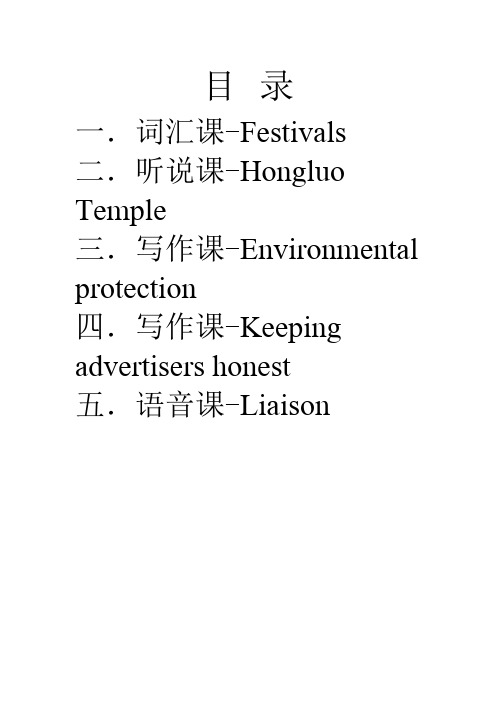
目录一.词汇课-Festivals 二.听说课-Hongluo Temple三.写作课-Environmental protection四.写作课-Keeping advertisers honest五.语音课-Liaison一.词汇课-Festivals1.题目:Festivals2.内容:The Dragon Boat Festival falls on the fifth day of the fifth month of the lunar year. As it is in earlysummer, it marks the beginning of the hottest season of the year.The tradition of the Dragon Boat Festival started more than 2,000 years ago. In the old days, dragon boatraces were organized only by Chinese people. However, in recent years, people from other cultures have also taken part in races and enjoyed the fun.T here is a special food for the festival. It is called Zongzi, which is sticky rice in freshbamboo leaves.3.基本要求:(1)全英文授课(2)朗读文章(3)要求讲解划线词汇教案FestivalsTeaching PlanI Teaching AimsKnowledge aims1. Students can understand the meaning of the underlined parts and master the usage of them.2. Students can get more information about Dragon Boat Festival.Ability aimStudents can improve their reading and inference abilities through class activities.Emotional aimStudents will have a better understanding about traditional cultures and motivate their patriotism.II Teaching Key &Difficult PointsKey point: the meaning and usage of “fall on, take part in an d sticky”;Difficult point: How to arouse students’patriotism in English teaching.IIITeaching procedures:Step 1: Warming upShow a video of a chorus performance, the name of which is Silent Night:Silent night!Holy night!All is calm, all is bright!Round young virgin mother and child! Holy Infant, so tender and mild,Sleep in heavenly peace. Sleep in heavenly peace.Then ask students to speak out the festival in the song and express their feelings.Step 2: Presentation1. Read the passage with correct pronunciation and intonation for the students and let them to summarize the main idea of each paragraph, after reading, invite one student writes down on the blackboard.2. Ask them to scan the passage and get the answers of the following questions using the expressions fromthe context:①When is Dragon Boat Festival?②In recent years, what is the change of Dragon Boat races?③How to make Zongzi?From their answers, let them guess the meaning of “fall on, take part in and sticky”, they can re fer to the passage, and the teacher explains the usage of them. Step 3: PracticeLet them substitute the underlined parts to rewrite the sentences, but not change the original meaning, for example,The Dragon Boat Festival is on the fifth day of the fifth month of the lunar year.Step 4: ProductionGuide students express their ideas of South Korea try to win the right of applying Dragon Boat Festivalinto non-material heritage.Step 5: Summary & HomeworkSummary: Students think about what they have learnt by themselves.Homework: Select the favorite festival and write an introduction about it according to the structure of Dragon Boat FestivalIV Blackboard design二.听说课-HongluoTemple1.题目:2.内容:Hongluo Temple is located at the southern foot of Hongluo Mountain on the northern outskirts of Beijing’s Huairou District. The temple, which is the largest Buddhist temple in northern China, was originally erected in CE 378, but was later renovated and enlarged during the Tang Dynasty (CE618-907).It’s original name was Daming Temple (it was also referred to as Huguo Temple at the time, thougha temple by that name has since been built in Anhui Province during the Qing Dynasty (CE 1644-1911)). The temple’s current name is derived from a l egend about a fairy maiden.3.要求:(1)针对文章内容设计口语活动(2)设计课堂活动(3)不得超过10 分钟(4)适当的板书设计教案Hongluo TempleTeaching PlanI Teaching AimsKnowledge aims1. Students can know the information about Hongluo Temple.2. Students can master the usage of some new words. Ability aimStudents can introduce certain famous places in English and get the required information from the passage. Emotional aims1. Students can enjoy the historical sites of China and feel proud of Chinese culture2. Students would like to participate in class activities activity.II Teaching Key &Difficult PointsKey point: the information about Hongluo Temple and introduce Hongluo temple in their own words. Difficult point: to introduce certain famous places and enjoy the historical sites of ChinaIIITeaching procedures:Step 1: Warming-up1.Greet students2.Ask students to share their traveling experience. Step 2: Pre-listeningAsk students to predicate what the main idea is of this passage according to the title.Step 3: While-listening1. Listen to the passage for the first time and have a check. Find out the main idea about this passage, thenfill in the blanks.2. Listen to the passage again and answer.Where is Hongluo Temple?What is the biggest feature of Hongluo Temple?Where is its current name derived from?3.Listen to the tape for the last time and find the time marks with the changes of Hongluo Temple.Step 4: Post-listeningAsk students to introduce Hongluo Temple as tour guide to foreigners according to the table andquestions.Step 5: Summary & HomeworkAsk students to summarize what have learned today. Homework: Ask students to search more information about Buddhist temple and Buddhism on the internet.IV Blackboard design三.写作课-Environmentalprotection1.题目:Environmental protection2.内容:With “environmental protection”as the theme, a lot of things if you throw will become a waste, so don’t smoke, don’t litter.3.要求:(1)英文授课(2)设计相关互动环节(3)根据文本内容授课,讲授写作课(4)适当板书教案Environmental protectionTeaching PlanI Teaching AimsKnowledge aim:Students can understand what kinds of actions should be taken to protect environment, and the meaning of these actions.Ability aim:Students can write a complete passage on this topic and express their ideas accurately in their composition. Emotional aims:Students would like to join some activities to improve their writing ability.They can understand the meaning of taking actions to protect out environment and they will practice these measures in their daily life.II Teaching Key &Difficult Points Teaching Key Point:They can know the reason why the environment is polluted, and what actions we should take to improve our environment.Teaching Difficult Point:Students can improve the confidence of writing, and not afraid of writing English.IIITeaching proceduresStep 1 Warming-upGreetingTalk about hot words such as SDR, One Belt One Road, then introduce Haze to students with the pictureand lead in today’s topic.Step 2 Pre-writingAsk them to work in groups of four and think about the causes and effects about pollution. Another task isto speak out the measure to fight against the pollution. Ask students to share their views and I will also add my point.Step 3 While-writingAsk them to write a short passage about environment protection, they can write their composition based onthe above discussion.While writing, I will ask them to pay more attention to the logic of structure and coherency of content.Step 4 Post-writingAfter they finished the writing, I will ask them to modify their drafts by themselves.Then I will ask some students to read their letters to us, and make some commentsStep 5 Summary and homework Summary: Make a short summary about what we have learnt today.Homework: Design some slogans about protecting the environment and share next class.IV Blackboard design四.写作课-Keepingadvertisers honest1.题目:Keeping advertisers honest2.内容:Organizations and individuals advertise because they want to persuade people to behave in certain ways,for example to buy a certain brand of rice, stop speeding or see a movie at their cinema. Advertisers go, to alot of trouble and expense to make adverts and so they want to make sure they achieve their purpose. Unfortunately, not all advertisers are good or honest people. Unless we have ways to protect ourselves, these dishonest advertisers will tell lies or use methods that may mislead us. Fortunately, most countries have developed ways to control advertising and prevent false or unsuitable advertising.3.基本要求:(1)全英授课(2)针对文章内容设计写作课(3)适当的板书设计教案Keeping advertisers honestTeaching PlanI Teaching AimsKnowledge aim:Students can understand what kinds of actions should be taken to keep advertisers honest, and the meaningof these actions.Ability aims:Students will be able to get the main information of the original text.Students can write a complete passage on this topic and express their ideas accurately in their composition. Emotional aims:Students would like to join some activities to improve their writing ability.They can understand the meaning of taking actions to keep advertisers honest.II Teaching Key &Difficult Points Teaching Key Point:They can come up with some meaningful measures to deal with the dishonest phenomenon in advertisement industry.Teaching Difficult Points:1. Students can avoid making mistakes while their writing;2. Students can improve the confidence of writing, and not afraid of writing English article.IIITeaching Methods:Task-based Teaching ApproachIVTeaching AidsPPT, picturesVTeaching proceduresStep 1 Warming-upI will show them some pictures about advertisements with slogans and let them discuss why the advertiserchoose these sentences as slogans, and think about whether the function of products is consistent with the slogan or not.Where there is a way, there is a Toyota.This is the slogan of a famous vehicle Toyota, we know that actually there is not a Toyota on this way, so it is just a kind of wish.After analyzing these ads, I will tell them the writing topic today is about advertisement.Step 2 Pre-writingAsk them to read the passage and answer the following questions.What’s your opinion on the dishonest behaviors in advertisement industry?Can you come up with some useful suggestions to keep advertiser honest?Some suggestions (teacher can share with students): One way to control advertising is to make laws that prevent advertisers doing the wrong thing. There are also laws in most places that prevent advertisers making false statements about their products or frompromoting immoral or harmful behavior.Advertising organizations should make rules for everyone in the organization to follow. Such as: Advertisements must not be untruthful or misleading; If well-known people are used in advertisements, they must be honest and truthful about products they advertise. Complain organization. A consumer can complain to the organization, giving reasons for their complaint,and if the complaint is correct, the organization can make the company stop using the offending advertisement. You may have heard the saying: "Buyer Beware". This means that the consumer is responsible for checkingthe product before buying. When it comes to advertising, consumers need to be careful about tricks used by advertisers so they can judge the claims for themselves and not blindly accept everything that is said in advertisements.Step 3 While-writingAsk them to write a short passage about dealing with dishonest advertisement behaviors, they can writetheir composition based on the above discussion.While writing, I will ask them to pay more attention to the spelling, grammar, and the logic of sentences.Step 4 Post-writingAfter they finished the writing, I will ask them to modify their drafts by themselves, and then exchangetheir draft to do the pair editing.Then I will ask some students to read their letters to us, and let them give some suggestions together.Step 5 Summary and homework Summary: Summarize their key points on the suggestion they listed:Making laws, the responsibility of advertising organizations, completing the system of complaints organization and let the buyer beware.Homework: Search on the internet and find out more interesting advertisement and think about the purposeof them.VI Blackboard design五.语音课-Liaison1.题目:Liaison2.内容:Fu mingxia said when I was nine years old start to Beijing to attend the diving training, hard training isthe foundation of success.Every time I stand on the podium in sweat behind the precipitation of honor.3.要求:(1)英文授课(2)设计相关互动环节(3)根据文本内容授课,讲解连读(4)适当板书教案LiaisonTeaching PlanI Teaching AimsKnowledge aimStudents can master the rule of liaison.Ability aimsStudents can recognize liaison parts in given material and can read it out correctly.Emotional aimStudents can improve their interests in English learning and feel the beauty of liaison.II Teaching Key &Difficult PointsKey point: the different rules of liaison.Difficult point: how to apply the rules into daily life. IIITeaching procedures:Step 1: Warming-up1. Daily greeting.2. Enjoy two version of an English poem Ode to the West. Let students to choose their favorite one ands tate the reasons, then lead in today’s topic---liaison. Step 2: Presentation1. Show the three sentences on the blackboard and let students read by themselves.2. Play the tape and let them to have a comparison and find the rule of liaison. We usually link the final consonant of the former word with the initial vowel of the following word.①I’ll call you in an instant.②John is a friend of mine.③I’m an actor.3.Add some tips when we read with liaison.a. Avoid speaking fast.b. Stress the content word.c. Don’t link between thought groups.Step 3: Practice1. Do some practice, read the phrases on the screen together: call up, come over, build up, where is.2. Ask students to underline the link parts with the learnt rule in the passage and add some if missed:“Fu mingxia said when I was nine years old start to Beijing to attend the diving training, hard training isthe foundation of success.Every time I stand on the podium in sweat behind the precipitation of honor.”Encourage them to have a try, read the passage to the whole class.Step 4: ProductionPlay a part of the famous film Frozen, give them the scripts and let them imitate the characters Anna, Christophe and Sven in a group of three, them perform out.Step 5: Summary & HomeworkAsk students to review what they learnt today. Homework: Explore more rules of Liaison and practice reading the poem Ode to the West.IV Blackboard design。
festival简介英文作文

festival简介英文作文英文:Festival is an important part of many cultures around the world. It is a time for people to come together and celebrate something special. Festivals can be religious, cultural, or seasonal, and they often involve music, dance, food, and other forms of entertainment.One of my favorite festivals is the Chinese New Year. It is celebrated in January or February each year and lasts for 15 days. During this time, people decorate their homes with red lanterns and banners, and they eat traditional foods like dumplings and rice cakes. There are also dragon and lion dances, fireworks, and other performances.Another festival that I enjoy is Halloween. It is celebrated on October 31st in many countries, and it is a time for people to dress up in costumes and go trick-or-treating. There are also haunted houses, pumpkin carvingcontests, and other spooky activities.Festivals are important because they bring people together and create a sense of community. They also allow us to learn about different cultures and traditions. For example, I have learned a lot about Chinese culture by attending the Chinese New Year celebrations in my city.In conclusion, festivals are a fun and meaningful way to celebrate and connect with others. Whether it is a religious, cultural, or seasonal festival, there is always something to enjoy and learn from.中文:节日是世界许多文化中重要的一部分。
festivals英文作文
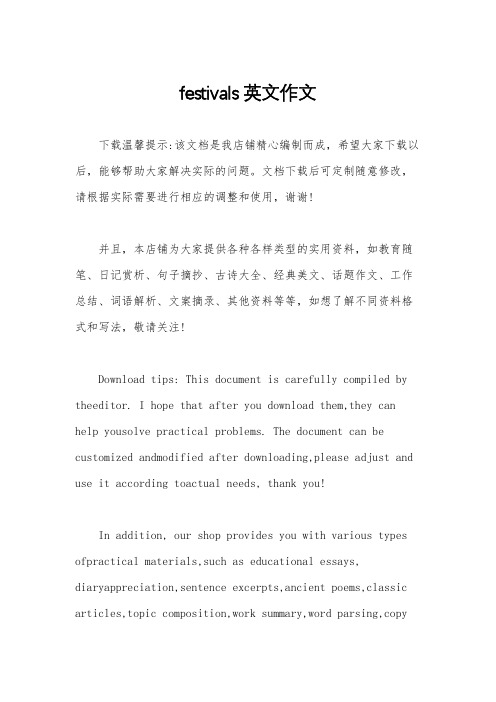
festivals英文作文下载温馨提示:该文档是我店铺精心编制而成,希望大家下载以后,能够帮助大家解决实际的问题。
文档下载后可定制随意修改,请根据实际需要进行相应的调整和使用,谢谢!并且,本店铺为大家提供各种各样类型的实用资料,如教育随笔、日记赏析、句子摘抄、古诗大全、经典美文、话题作文、工作总结、词语解析、文案摘录、其他资料等等,如想了解不同资料格式和写法,敬请关注!Download tips: This document is carefully compiled by theeditor. I hope that after you download them,they can help yousolve practical problems. The document can be customized andmodified after downloading,please adjust and use it according toactual needs, thank you!In addition, our shop provides you with various types ofpractical materials,such as educational essays, diaryappreciation,sentence excerpts,ancient poems,classic articles,topic composition,work summary,word parsing,copyexcerpts,other materials and so on,want to know different data formats andwriting methods,please pay attention!Festivals are a time for people to come together and celebrate. They bring joy, excitement, and a sense of community. Whether it's a music festival, a food festival, or a cultural festival, there's always something for everyone to enjoy.One of the best things about festivals is the food. From traditional dishes to new and exciting creations, there's always something delicious to try. And let's not forget about the drinks – whether it's a cold beer, a fruity cocktail, or a warm cup of mulled wine, there's always a drink to suit the occasion.Music is another big part of festivals. Whether it's a big-name headliner or a local band, there's always something to get you up and dancing. The atmosphere is electric, and there's nothing quite like singing along with a crowd of people who are all having a great time.Of course, festivals are also a great opportunity to learn about different cultures. From traditional dances to handmade crafts, there's always something new and interesting to discover. It's a chance to broaden your horizons and gain a greater understanding of the world around you.But perhaps the best thing about festivals is the sense of community they bring. Whether you're with friends, family, or even strangers, there's a feeling of togetherness that can't be beaten. It's a time to make memories and connect with others in a way that's truly special.。
festivals 说课稿

festivals 说课稿Title: Festivals Lesson PlanIntroduction:In this lesson plan, we will discuss the topic of festivals. Festivals are an important part of culture and tradition in many societies around the world. They provide opportunities for people to come together, celebrate, and share common values. In this lesson, we will explore the significance of festivals, different types of festivals, and how they are celebrated in various cultures.I. Significance of Festivals1.1 Festivals as cultural celebrations- Festivals serve as important cultural celebrations that are passed down from generation to generation.- They help to preserve and promote cultural heritage, traditions, and values.- Festivals provide a sense of identity and belonging for individuals and communities.1.2 Festivals as social gatherings- Festivals bring people together, fostering a sense of community and unity.- They provide opportunities for social interaction, bonding, and networking.- Festivals strengthen social ties and relationships among individuals and groups.1.3 Festivals as religious observances- Many festivals have religious significance and are observed as acts of worship or devotion.- They help to reinforce religious beliefs, practices, and teachings.- Festivals provide a platform for spiritual growth, reflection, and renewal.II. Types of Festivals2.1 Cultural festivals- Cultural festivals celebrate specific aspects of a culture, such as music, dance, food, or art.- They showcase the diversity and richness of a culture's traditions and customs.- Cultural festivals often include performances, exhibitions, workshops, and other cultural activities.2.2 Religious festivals- Religious festivals are dedicated to the observance of religious events, rituals, or figures.- They are often marked by prayers, ceremonies, processions, and other religious practices.- Religious festivals may involve fasting, feasting, charity, and acts of piety.2.3 Seasonal festivals- Seasonal festivals are based on the changing of seasons and natural cycles.- They celebrate the harvest, solstices, equinoxes, or other seasonal events.- Seasonal festivals often involve agricultural rituals, feasts, and festivities.III. Celebrating Festivals3.1 Traditional customs and practices- Festivals are celebrated through traditional customs, rituals, and practices that have been passed down through generations.- These customs may include decorating homes, wearing traditional attire, preparing special foods, and performing cultural activities.- Festivals may also involve specific rituals, ceremonies, or performances that are unique to the occasion.3.2 Community participation- Festivals are community events that involve the participation of individuals, families, and groups.- Communities come together to organize and plan festivals, contributing their time, resources, and talents.- Festivals provide opportunities for community engagement, collaboration, and cooperation.3.3 Globalization and modernization- In today's globalized world, festivals are increasingly influenced by external factors, such as technology, media, and commercialization.- Festivals may incorporate modern elements, such as digital technology, social media, and online platforms.- Globalization and modernization have led to the fusion of traditional and contemporary elements in festival celebrations.IV. Festivals Around the World4.1 Chinese festivals- Chinese festivals, such as Chinese New Year, Mid-Autumn Festival, and Dragon Boat Festival, are based on lunar calendar dates.- They involve traditional customs, rituals, and activities, such as lion dances, lantern festivals, and dragon boat races.- Chinese festivals emphasize family reunion, prosperity, good luck, and cultural heritage.4.2 Indian festivals- Indian festivals, such as Diwali, Holi, and Navratri, are based on religious and cultural traditions.- They are marked by colorful decorations, festive attire, traditional foods, and religious ceremonies.- Indian festivals celebrate the victory of good over evil, the arrival of spring, and the worship of deities.4.3 European festivals- European festivals, such as Oktoberfest, Carnival, and Christmas markets, are celebrated across different countries and regions.- They showcase local traditions, cuisines, crafts, and performances.- European festivals attract tourists, promote cultural exchange, and boost local economies.V. ConclusionIn conclusion, festivals play a significant role in society by celebrating culture, fostering social connections, and promoting religious observance. They provide opportunities for individuals and communities to come together, share common values, and create lasting memories. By understanding the significance of festivals, exploring different types of festivals, and experiencing festival celebrations around the world, we can appreciate the diversity and richness of human culture and tradition.。
festival英语话题作文高中

festival英语话题作文高中全文共3篇示例,供读者参考篇1The festival season is a special time of the year that brings people together to celebrate, relax and have fun. Festivals are an important part of our culture and traditions, and they provide a unique opportunity to create lasting memories with family and friends. In this essay, we will explore the significance of festivals, their impact on society, and some of the most popular festivals celebrated around the world.Festivals play a crucial role in our lives by allowing us to take a break from our busy schedules and enjoy the company of our loved ones. They provide a sense of unity and belonging as people come together to celebrate common beliefs, values, and traditions. Festivals also serve as a time for reflection, gratitude, and spiritual rejuvenation, as individuals take the opportunity to connect with their inner selves and with the divine.One of the most important aspects of festivals is their impact on society. Festivals have the power to bring people of diverse backgrounds together, fostering mutual understanding, respect,and harmony. They promote cultural exchange and appreciation, as individuals learn about and participate in different customs, rituals, and practices. Festivals also stimulate the economy by boosting tourism, promoting local businesses, and creating employment opportunities. Furthermore, festivals contribute to social cohesion by strengthening community ties, promoting social interactions, and fostering a sense of belonging and pride.Now let's take a look at some of the most popular festivals celebrated around the world. One of the most famous festivals is Diwali, also known as the Festival of Lights, which is celebrated by Hindus, Sikhs, Jains, and Buddhists. Diwali is a time of joy, prosperity, and renewal, marked by the lighting of lamps, fireworks, feasting, and gift-giving. Another widely celebrated festival is Chinese New Year, which marks the beginning of the lunar new year and is characterized by dragon dances, fireworks, family reunions, and the exchange of red envelopes containing money for good luck.In the West, Christmas is one of the most anticipated festivals of the year, commemorating the birth of Jesus Christ. Christmas is marked by decorating Christmas trees, exchanging gifts, attending church services, and enjoying festive meals with family and friends. Similarly, Thanksgiving is a beloved Americanholiday that celebrates the harvest season and gives thanks for the blessings of the past year. Thanksgiving is traditionally celebrated with a bountiful feast, parades, football games, and expressions of gratitude.In conclusion, festivals are a cherished part of our cultural heritage that bring people together, promote unity and understanding, and create lasting memories. Whether it's Diwali in India, Chinese New Year in China, Christmas in the West, or Thanksgiving in America, festivals play a vital role in enriching our lives and strengthening our social fabric. Let us continue to cherish and celebrate festivals as a time of joy, togetherness, and renewal.篇2Festival is an important part of every culture around the world. It is a time for people to come together and celebrate their heritage, traditions, and values. Festivals can range from religious ceremonies to cultural events, but they all share the common goal of bringing people together in a spirit of joy and unity.In my country, there are many festivals that we celebrate throughout the year. One of the most popular festivals is theLunar New Year, which marks the beginning of the new year based on the lunar calendar. During this time, families gather together to exchange gifts, eat special foods, and participate in various customs and rituals to bring good luck and prosperity for the coming year.Another important festival in my country is the Mid-Autumn Festival, also known as the Mooncake Festival. This festival is celebrated by eating mooncakes, a traditional pastry filled with sweet lotus seed paste or other fillings, and admiring the full moon. Families often gather outdoors to watch traditional dragon dances and lantern processions, creating a festive and joyful atmosphere.One of the most colorful and vibrant festivals in my country is the Spring Festival, also known as Chinese New Year. This festival is celebrated with fireworks, dragon and lion dances, and parades featuring traditional costumes and performances. Families decorate their homes with red lanterns and banners, symbolizing good luck and fortune in the coming year.In addition to these traditional festivals, my country also celebrates modern festivals such as music festivals, food festivals, and art festivals that showcase the diversity and creativity of our culture. These festivals are a time for people to come togetherand enjoy music, dance, food, and art in a fun and lively atmosphere.Overall, festivals are a time for people to celebrate their culture, traditions, and values with their families and communities. They provide a sense of connection and belonging, and help to strengthen the bonds between people. Festivals are a time for joy, unity, and celebration, and they play an important role in bringing people together in a spirit of harmony and togetherness. So, let's enjoy and celebrate the festivals in our country and share the joy with others around the world.篇3Festivals are an integral part of human culture and have been celebrated for centuries all around the world. These occasions bring people together, promote traditions, and create special memories that last a lifetime. In this essay, we will explore the significance of festivals, different types of festivals, and their impact on society.First and foremost, festivals play a crucial role in preserving cultural heritage and promoting unity among communities. They provide a platform for people to showcase their customs, traditions, and values. Through various rituals, performances,and activities, festivals help to pass down traditions from one generation to the next. For example, Chinese New Year celebrations include dragon dances, fireworks, and the giving of red envelopes, which symbolize good luck and prosperity. These traditions have been passed down for centuries and continue to be practiced by families around the world.Furthermore, festivals serve as a form of entertainment and a break from the monotonous routine of daily life. They offer people a chance to relax, have fun, and enjoy themselves with friends and family. Music festivals, such as Coachella and Glastonbury, attract thousands of attendees each year who come together to listen to their favorite bands, dance, and create lasting memories. These events provide a sense of escapism and joy that can uplift spirits and rejuvenate the soul.In addition, festivals have a significant economic impact on society, particularly in terms of tourism and local businesses. Many festivals attract visitors from far and wide, who spend money on accommodation, transportation, food, and souvenirs. This influx of tourism boosts the local economy, creates job opportunities, and supports small businesses. For example, the Oktoberfest in Munich, Germany, is a world-renowned beerfestival that attracts millions of visitors each year and generates millions of dollars in revenue for the city.Moreover, festivals play a role in fostering social cohesion and promoting cultural diversity. They provide a space for people of different backgrounds, religions, and beliefs to come together and celebrate their shared humanity. Festivals such as Diwali, Eid al-Fitr, and Christmas bring people of all faiths and backgrounds together to celebrate and appreciate each other's traditions. This intercultural exchange fosters tolerance, understanding, and respect for diversity, which are essential in today's globalized world.In conclusion, festivals are a vibrant and essential aspect of human culture that celebrate tradition, creativity, and community. They bring people together, promote cultural heritage, and provide a source of joy and entertainment. As we continue to celebrate festivals around the world, let us be mindful of their importance in preserving our shared humanity and promoting unity among all people.。
festivals 说课稿

festivals 说课稿节日说课稿一、教学目标通过本节课的学习,学生将能够:1. 了解不同国家的传统节日,并能够描述这些节日的庆祝活动和特色;2. 学习并掌握与节日相关的词汇和表达;3. 提高听说能力,能够用英语交流关于节日的话题。
二、教学重点1. 学习节日相关的词汇和表达;2. 提高听说能力,能够用英语交流关于节日的话题。
三、教学准备1. 多媒体设备;2. 卡片或图片,用于展示节日的相关信息;3. 课件和PPT,用于呈现课堂内容。
四、教学过程Step 1: Warm-up (5 minutes)1. Greet the students and ask them if they have any favorite festivals. Share your own favorite festival with the class.2. Show pictures of different festivals on the screen and ask the students if they can recognize any of them. Encourage them to share what they know about these festivals.Step 2: Presentation (10 minutes)1. Introduce the topic of festivals and explain that festivals are special events celebrated by people to mark important occasions or traditions.2. Present a few examples of festivals from different countries, such as Chinese New Year, Christmas, and Diwali. Show pictures and briefly explain the significance and traditions of each festival.3. Introduce festival-related vocabulary, such as "celebrate," "tradition," "decorate," and "fireworks." Write these words on the board and explain their meanings.Step 3: Practice (15 minutes)1. Divide the students into pairs or small groups and give each group a set of festival-related vocabulary cards.2. Instruct the students to take turns picking a card and using the word on the card to make a sentence about a festival. Encourage them to be creative and use their imagination.3. Monitor the students' conversations and provide assistance when needed.Step 4: Listening (15 minutes)1. Play an audio recording or show a video clip about a specific festival. Make sure the content is appropriate for the students' level.2. After the listening activity, ask the students some comprehension questions to check their understanding of the festival.Step 5: Speaking (20 minutes)1. Divide the students into new pairs or groups and assign each group a different festival to discuss.2. Instruct the students to talk about the festival they were assigned, including its traditions, food, and activities. Encourage them to ask each other questions and have a conversation about the festival.3. Monitor the students' conversations and provide feedback on their speaking skills.Step 6: Wrap-up (5 minutes)1. Have a class discussion about the different festivals the students learned about.Ask them to share any interesting facts or new information they discovered.2. Summarize the key points of the lesson and review the festival-related vocabulary.五、教学延伸1. Encourage the students to research and present on a festival of their choice. They can create a poster or a short presentation to share with the class.2. Assign a writing task where the students describe their favorite festival andexplain why they enjoy it.六、教学评估1. Observe the students' participation and engagement during class activities.2. Assess the students' speaking skills during the speaking activity.3. Review the students' written work if assigned.七、教学反思本节课通过多种教学方法,如图片展示、听力、口语练习等,让学生了解了不同国家的传统节日。
文档:Festivals
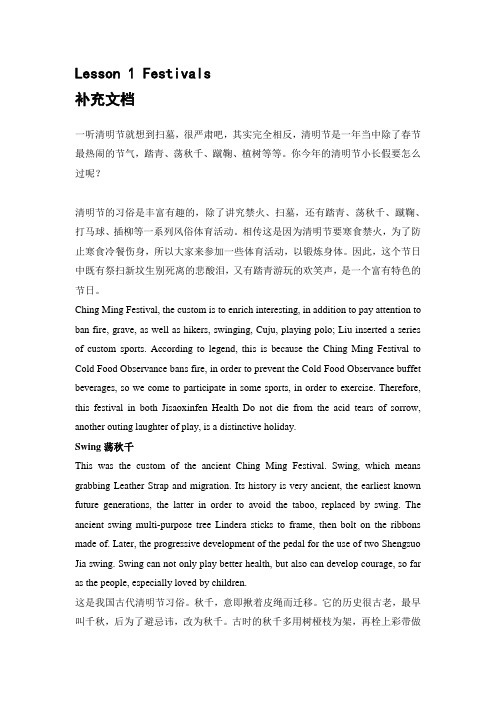
Lesson 1 Festivals补充文档一听清明节就想到扫墓,很严肃吧,其实完全相反,清明节是一年当中除了春节最热闹的节气,踏青、荡秋千、蹴鞠、植树等等。
你今年的清明节小长假要怎么过呢?清明节的习俗是丰富有趣的,除了讲究禁火、扫墓,还有踏青、荡秋千、蹴鞠、打马球、插柳等一系列风俗体育活动。
相传这是因为清明节要寒食禁火,为了防止寒食冷餐伤身,所以大家来参加一些体育活动,以锻炼身体。
因此,这个节日中既有祭扫新坟生别死离的悲酸泪,又有踏青游玩的欢笑声,是一个富有特色的节日。
Ching Ming Festival, the custom is to enrich interesting, in addition to pay attention to ban fire, grave, as well as hikers, swinging, Cuju, playing polo; Liu inserted a series of custom sports. According to legend, this is because the Ching Ming Festival to Cold Food Observance bans fire, in order to prevent the Cold Food Observance buffet beverages, so we come to participate in some sports, in order to exercise. Therefore, this festival in both Jisaoxinfen Health Do not die from the acid tears of sorrow, another outing laughter of play, is a distinctive holiday.Swing荡秋千This was the custom of the ancient Ching Ming Festival. Swing, which means grabbing Leather Strap and migration. Its history is very ancient, the earliest known future generations, the latter in order to avoid the taboo, replaced by swing. The ancient swing multi-purpose tree Lindera sticks to frame, then bolt on the ribbons made of. Later, the progressive development of the pedal for the use of two Shengsuo Jia swing. Swing can not only play better health, but also can develop courage, so far as the people, especially loved by children.这是我国古代清明节习俗。
高一英语Unit 14 Festivals(1)人教版知识精讲

高一英语Unit 14 Festivals〔1〕人教版[同步教育信息]一. 本周教学内容:Unit 14 Festivals〔1〕1. dress updress作“打扮自己〞的解释,与介词as或like连用,或用dress up as sb. 或like 连用,或用dress up as sb. 或dress up for sth.。
〔1〕They all dress up as PLA men . 他们都打扮成解放军模样。
〔2〕She dressed up in Elizabethan costumes for the fancy dress ball .她穿上伊丽莎白时代的服装去参加化装舞会。
〔3〕The little boy likes to dress himself as a policeman . 这小男孩喜欢扮成警察。
2. get together 聚集,相聚在一起I hope we can get together one day . 我希望有一天我们能相聚一处。
get-together n. 聚会,联欢会We had a get-together last Saturday . 上周六我们举行了一个聚会。
3. greet〔1〕vt. 向……问候,欢迎,打招呼①They were waiting at the airport to greet him . 他们在机场等候迎接他。
②He greeted his friend by saying “ Good morning ! 〞他向他的朋友道“早安〞致意。
③He greeted me with a kiss . 她以一个吻迎接我。
④The news was greeted with general cheers . 那个消息受到了大家的欢呼。
〔2〕映入〔眼帘〕;传入〔耳中〕,扑鼻The smell of coffee greeted me when I entered the room .我进入那个房间的时候,咖啡味扑鼻而来。
高中英语语法精讲(UnitFestivals)大纲人教版第一册

语法精讲Modal Verbs(2)情态动词—must,have to,have got to1.must表示“必须;应该”,是说话人的主观看法。
have to表示“必须”“不得不”,表示的是客观需要。
must只有一种形式,而have to 有has to、had to、will have to 等多种形式。
We m ust keep steps to the scientific development.我们一定要与科学的发展步调一致。
He has to be back home by five to fetch his son from kindergarten.他必须在5点钟前回家去幼儿园接他儿子。
2.must’t表示“不应该”“不许可”“禁止”“不准”。
因此在回答must问句时,否定式常用needn’t或d on’t have to。
You must not speak ill of others.你一定不要说别人的坏话。
—Must I finish the job before nine tonight?—Yes,you must.—No,you needn’t./No,you don’t have to.3.have to可用have got to 代替。
考题再现【考例1】(2006湖南高考,32)Some aspects of a pilot’s job ________ be boring,and p ilots often ________ work at inconvenient hours.A.can;have toB.may;canC.have to;mayD.ought to;must解析:本题考查情态动词的用法。
句意为:“飞行员工作的某些方面可能是令人厌倦的,并且飞行员经常在不方便的时候工作。
”第一空表示的是客观的可能性,应用can;而第二空说在不方便的时候还要干,因此表示客观上的必须,用have to,意为“不得不”。
- 1、下载文档前请自行甄别文档内容的完整性,平台不提供额外的编辑、内容补充、找答案等附加服务。
- 2、"仅部分预览"的文档,不可在线预览部分如存在完整性等问题,可反馈申请退款(可完整预览的文档不适用该条件!)。
- 3、如文档侵犯您的权益,请联系客服反馈,我们会尽快为您处理(人工客服工作时间:9:00-18:30)。
Step1:Warming up
Good afternoon,everyone!Nice to see you again.Now,let us look at this picture,what is it?Yes,it is a boat, accurately,it is a dragon boat.So do you know a Chinese traditional festival named Dragon boat festival?I think you must know it.Do you know when it is?Yes,it is in May.OK,very good!So today our topic is about this traditional festival.
Step2:Presentation
1.Now,please open your book and turn to page1
2.Here is a passage.I will read it to you,after that,please summarize the main idea of each paragraph.Then I will invite one student to tell your answer.OK,now listen carefully!
OK,do you get the main idea of each paragraph?Marisa,please tell me your answer!OK,sit down please! You summarized quite complete.The first paragraph mainly talks about the time and meaning of this traditional festival.The second paragraph talks about the changes of it,and the last paragraph talks about the food of this festival.
2.Now,please read this passage again and guess the meaning of the following words:
①fall on②take part in③sticky
You can discuss with your desk mate.3minutes later,let’s check the meaning together.
Finished?Do you get the meaning of these words?OK,the first one,fall on,what does it mean?It means to occur at some particular point in time,for example,we can say:My birthday falls on a Thursday this year.Besides, fall on also means drop,attack.
Now,let us look at the second word“take part in”,what does it mean?Yes,I heard someone say it means attend.Great,it also means join or participate.Are you clear?
The last one,sticky,who knows the meaning?Look at my finger,I put some glue on my finger,it is sticky, right?It means that tending to attach because of a glue-like surface.We also can say,the chewing gum is sticky.
Step3:Practice
Now,I will give you3minutes to work in pairs and make sentences by using these three words.After finished, I will ask some students to read your sentences to us.Got it?OK,take your time.
My coat got dirty when it fell on the muddy floor.
Their anniversary falls upon a Saturday this year.
We'll take part in social practice during the summer vacation.
We often take part in physical labor.
I am uncomfortable because my body is sticky.
Yuanxiao is a kind of sticky round dumplings.
Step4:Production
Now,let us do a group discussion.Work in group of4and talk about the festivals you know in foreign countries.You can introduce this festival according to the text and use the new words as much as possible.You are supposed to finish discussion in6minutes.Are you clear?OK,lets do it!
Time is limited!So,who wants to share your ideas?What about this group?Who wants to be the representative?OK,John,brave boy!Oh,please in ENGLISH!OK,sit down please!Your presentation is so wonderful!He introduced the Easter Day!Chocolate egg is traditionally eat on Easter day.Good!
Step5:Summary&Homework
Summary:Students think about what they have learnt by themselves.
Homework:Select the favorite festival and write an introduction about it according to the structure of Dragon Boat Festival.
IV Blackboard design
V Teaching Reflection
Festivals Paragraph1time and meaning Paragraph2the races in past and nowadays Paragraph3food
fall on,take part in,sticky。
